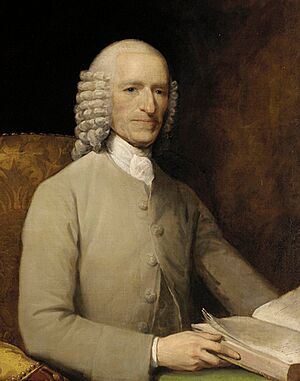John Fothergill (physician) facts for kids

John Fothergill (born March 8, 1712 – died December 26, 1780) was an important English doctor. He was also a plant collector, a kind helper of others (philanthropist), and a member of the Quaker religious group. His medical writings were very important, and he created a large garden filled with plants in what is now West Ham Park in London.
A Doctor's Life and Work
John Fothergill was born in a place called Carr End, near Bainbridge in Yorkshire. His father, also named John Fothergill, was a Quaker preacher and farmer.
After studying at Sedbergh School, John Fothergill trained to be a pharmacist's assistant. In 1736, he earned his Doctor of Medicine degree at the University of Edinburgh. He then continued his studies at St Thomas's Hospital in London.
After traveling around Europe in 1740, he settled in London. There, he became a very busy doctor. During the flu outbreaks of 1775 and 1776, it is said he treated 60 patients every day!
In 1745, Fothergill gave a short talk to the Royal Society in London. He spoke about the work of a Scottish doctor named William Tossach. This talk was the first known lecture about how to do mouth-to-mouth breathing to help someone who can't breathe.
He was also the first to describe and name a painful face condition called trigeminal neuralgia in his book Of a Painful Affection of the Face in 1773. He also wrote about other heart conditions like angina and a serious throat infection called diphtheria.
Fothergill's small book Account of the Sore Throat attended with Ulcers (1748) was one of the first times streptococcal sore throat was described in English. This book was translated into many languages. He refused to use old, unhelpful treatments for the disease, which saved many lives.
He was a close friend of Benjamin Franklin, a famous American inventor and statesman. Fothergill also helped publish Franklin's writings about electricity and wrote an introduction for them.
Plants, Quakers, and Helping Others
In his free time, Fothergill enjoyed studying conchology (shells) and botany (plants). In 1762, he bought Upton House in West Ham, Essex (which is now part of Greater London). There, he created a huge botanical garden. He grew many rare plants that he got from different parts of the world. This garden is now West Ham Park.
The garden had many glasshouses to protect the plants. Another Quaker doctor, John Coakley Lettsom, who Fothergill helped, said that in the garden, "the sphere seemed transposed, as the Arctic Circle joined with the equator." This meant plants from cold places and hot places grew together! Lettsom later wrote a list of all the plants in Fothergill's garden.
A type of plant called Fothergilla is named in his honor. When you see a plant name with "Foth." after it, it means John Fothergill helped name or describe that plant. He became a member of the Royal Society in 1763 and the American Philosophical Society in 1770.
Fothergill supported many explorers and scientists. He helped Sydney Parkinson, who traveled to the South Seas, and William Bartram, an American botanist who explored the southern United States from 1773 to 1776. He also paid for a special translation of the Bible, known as the Quaker Bible, to be printed.
In 1779, he started Ackworth School in Pontefract, Yorkshire, which is still a school today.
John Fothergill passed away in London on December 26, 1780, at the age of 68. He was a very respected man. The writer Frances Burney once described him as "amazingly civil and polite... as kind as he is skilful." His niece, Betty Fothergill, wrote in her diary that he was "surely the first of men. With the becoming dignity of age he unites the cheerfulness and liberality of youth. He possesses the most virtues and the fewest failings of any man I know."
See also
 In Spanish: John Fothergill para niños
In Spanish: John Fothergill para niños
- Fothergill's sign
 | William M. Jackson |
 | Juan E. Gilbert |
 | Neil deGrasse Tyson |

